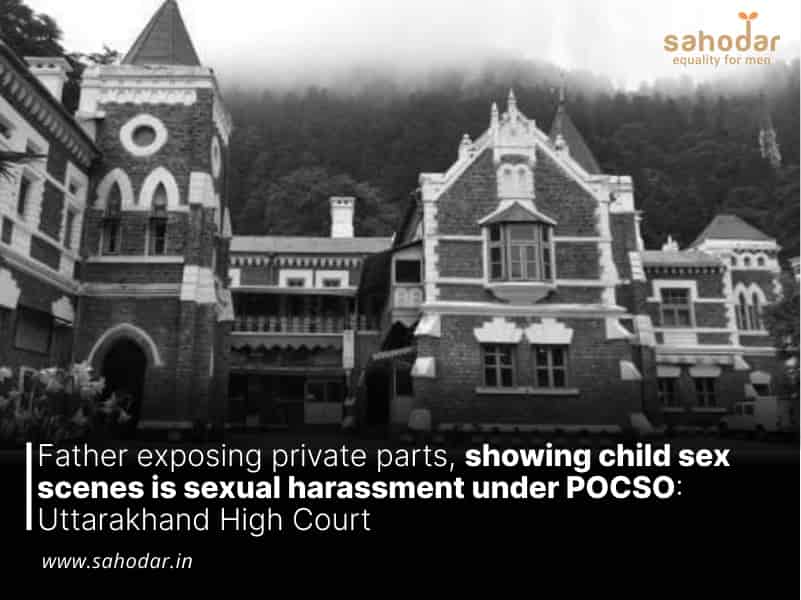The Court also upheld the family court’s order directing him to pay ₹25,000 per month to his wife and ₹20,000 per month to his son as maintenance under Section 125 Code of Criminal Procedure (CrPC).
A father revealing his private parts to his child and showing them explicit films is considered an offence under the Protection of Children from Sexual Offences Act (POCSO Act), as recently noted by the Uttarakhand High Court.
Justice Ravindra Maithani upheld a trial court’s decision to summon the father to face charges under Sections 11 (enticing a child for pornographic purposes) and 12 (sexual harassment) of the POCSO Act for allegedly sexually harassing his son.
“The child has also been examined under Section 164 of the Code. The child has stated that his father does Gandi Gandi Cheeze. He would show dirty videos. Here intent can be presumed under Section 30 of the POCSO Act. Exhibition of private part to a child, showing him dirty films, as told by the child himself prima facie makes out an offence under Section 11 read with Section 12 of the POCSO Act,” the Court held.
The Court also upheld the family court’s decision ordering the man to pay ₹25,000 per month to his wife and ₹20,000 per month to his son for their support under Section 125 of the Code of Criminal Procedure (CrPC).
The case was filed by his wife, whom he married in December 2010. She claimed that he repeatedly forced her into anal intercourse, causing serious injuries and bleeding that required hospital treatment.
Despite her injuries, the petitioner continued his actions, which included physical assaults and forced sexual acts.
The woman also alleged that the husband subjected their child, aged 8 to 10 months, to inappropriate behaviour by showing explicit content on his laptop so that the wife would succumb to his demands for anal sex.
It was also alleged he would throw things around, urinate in the room, expose his private parts to the young child and have oral sex forcibly in front of the child.
The man appealed to the High Court, challenging the first information report and the orders to appear in court.
His lawyer argued that the actions in question were not intended to sexually harm the child. Instead, they claimed that showing explicit content on the laptop was meant to pressure the child’s mother into agreeing to the man’s demands. Therefore, they argued that no crime under the POCSO Act had occurred.
The Court noted that during the examination, the child admitted that his father displayed inappropriate behavior and showed him explicit videos.
As a result, the Court decided not to interfere with the summoning order concerning the offences under the POCSO Act.
Another issue the court considered was whether a husband can be prosecuted under Section 377 (unnatural offences) of the Indian Penal Code (IPC) for having anal sex with his wife.
The Court referred to a Madhya Pradesh High Court ruling in the Umang Singhar v. State case, which stated that
In view of amended definition of Section 375 IPC, offence under Section 377 IPC between husband and wife has no place and, as such it is not made out.”
The petitioner’s lawyer pointed to the Supreme Court’s Navtej Singh Johar case, arguing that terms like unnatural sex are not clearly defined by law.
The petitioner claimed that if two consenting adults engage in such acts privately, it shouldn’t be considered a crime.
He also argued that if the wife refuses to have sex for a long time, it could be seen as mental cruelty towards the husband.
The Court agreed with the husband’s argument that consensual anal sex between a man and a woman in private is not a crime under Section 377 IPC.
For a married couple who are both adults, their consent is clear and sufficient. As a result, such acts are not considered a crime under Section 377 IPC and are covered by exception 2 of Section 375 IPC, the Court said.
The Court changed the summoning order to only uphold the charges under the POCSO Act and dropped the charge under Section 377 IPC.
The Court said, “We believe the summoning order needs to be changed because no offence under Section 377 IPC applies to the revisionist,” and partially agreed with the man’s appeal.
The trial will now proceed based on Section 11 and Section 12 of the POCSO Act.
The petitioner was represented by advocate Aditya Singh.
Advocates Saurabh Pandey and Navneet Kaushik appeared for respondents.

